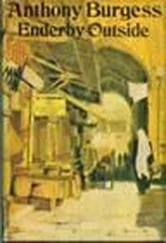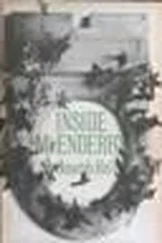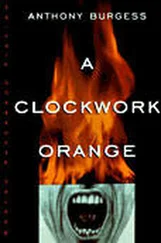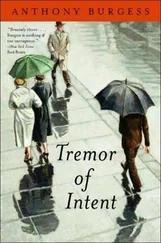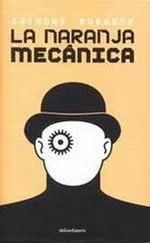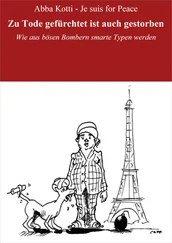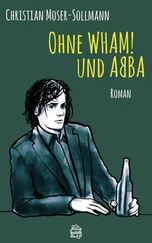Anthony Burgess - ABBA ABBA
Здесь есть возможность читать онлайн «Anthony Burgess - ABBA ABBA» весь текст электронной книги совершенно бесплатно (целиком полную версию без сокращений). В некоторых случаях можно слушать аудио, скачать через торрент в формате fb2 и присутствует краткое содержание. Жанр: Современная проза, на английском языке. Описание произведения, (предисловие) а так же отзывы посетителей доступны на портале библиотеки ЛибКат.
- Название:ABBA ABBA
- Автор:
- Жанр:
- Год:неизвестен
- ISBN:нет данных
- Рейтинг книги:5 / 5. Голосов: 1
-
Избранное:Добавить в избранное
- Отзывы:
-
Ваша оценка:
- 100
- 1
- 2
- 3
- 4
- 5
ABBA ABBA: краткое содержание, описание и аннотация
Предлагаем к чтению аннотацию, описание, краткое содержание или предисловие (зависит от того, что написал сам автор книги «ABBA ABBA»). Если вы не нашли необходимую информацию о книге — напишите в комментариях, мы постараемся отыскать её.
ABBA ABBA — читать онлайн бесплатно полную книгу (весь текст) целиком
Ниже представлен текст книги, разбитый по страницам. Система сохранения места последней прочитанной страницы, позволяет с удобством читать онлайн бесплатно книгу «ABBA ABBA», без необходимости каждый раз заново искать на чём Вы остановились. Поставьте закладку, и сможете в любой момент перейти на страницу, на которой закончили чтение.
Интервал:
Закладка:
Giovanni Gulielmi's mother decided, in tremulous old age, that she would leave Rome and die in England. Gulielmi took her back overland on a long and painful journey. When they reached Manchester in 1832 she was not quite ready for death, but her son reserved a plot for her in Moston Cemetery. Meanwhile, forty years old, he fell in love with Sara Higginbotham, the daughter of a Manchester cotton broker and nearly twenty years his junior. Gulielmi sold his Italian property and bought a house of some size in Rusholme, close to Platt Fields. His mother duly died and he wrote an indifferent sonnet in English extolling her virtues. He prospered as the translator of Dicken's novels into Italian, taught Italian privately, helped certain Manchester cotton houses with their Italian and French correspondence.
Mr and Mrs Gulielmi had one child only, a son named Joseph Joachim, born in 1840. Joseph Joachim was trained as a singer at the Manchester Royal College of Music, and had a notable bass voice notably heard in performances of Handel and Mendelssohn oratorio and in sung mass at the Church of the Holy Name, Manchester, but he became best known as a private teacher of bel canto and pianoforte. Manchester was then, as now, a very musical city. Joseph Joachim married a Scottish lady, Ann Mackenzie, and had three children. The youngest child, Joseph John Gulielmi, worked for the United Cattle Products Company and anglicised his name to Wilson during a wave of anti-Italian feeling occasioned by alleged ice-cream poisoning in the 1890s in the Lancashire coastal resorts of Blackpool, Clevelys, Bispham and Fleetwood.
Joseph John Wilson married an Irish waitress he met in one of the U.C.P. restaurants in Manchester. This girl, six months after the marriage, gave birth to a son named for his grandfather Joseph Joachim. This boy, born in Moss Side in 1916, was to be – by a twist if not genetic then purely coincidental, since family interest in Giuseppe Gioacchino Belli was born and apparently died with the founder of the family – the translator into English of the great Roman poet. He had no linguistic endowment for the task, since Italian was no longer spoken in the family, but as a boy at St Bede's College, Manchester, he showed skill in facetious or scurrilous versifying and a passion for the Petrarchan sonnet-form. While in the Fifth Form he openly sneered in class at Wordsworth's ineptness in management of the ABBA ABBA rhyme-scheme as also at Rupert Brooke's timidity. But he praised the fearlessness of Gerard Manley Hopkins, a poet not then much read. He drew laughter from his fellow-pupils and his English teacher alike when he stoutly declared that Keats's best Petrarchan sonnet was the one on Mrs Reynolds's cat.
J. J. Wilson was himself no poet. He made a strict distinction, even as a schoolboy, between the art of poetry and the craft of verse. His approach to the craft of the Petrarchan sonnet may be seen in three versifyings of low jokes made at the age of eighteen and submitted to the school magazine. They were rejected but not before they had, by some oversight, got into galley proof.
The Bet
Some men were talking, as men often will,
About their wives. And each with each one vied.
Over his beer, with a grim sort of pride,
Saying: "Mine's ugly." – "But mine's uglier still,"
Comparing photographs. "If looks could kill,
My missis could effect mass homicide.
Just look." But one man, with no picture, cried:
"Ugly? Come home with me and feast your fill."
A bet, then? Reet. The money was not lacking,
A quid per man. Their winter breaths asmoke,
They homed with him when "Time please" sent them packing.
"Get ready, missis." From upstairs she spoke:
"Am I to hide me face wi' piece of sacking?"
"Nay," he called, "it's a bet, lass, not a poke."
"The ashes of my dear departed?" said
The widow, serving tea and cakes at five
Five days after the funeral. "I contrive
To house them aptly. No, not lapped in lead.
See, they are in an eggtimer instead,
There on the mantelpiece. Ah, ladies, I've
Determined, since he did no work alive,
The lazy pig shall do some now he's dead."
One widow took her man's remains as snuff,
Achieving an orgasmic kind of sneeze.
She said: "The bugger's appetite was rough.
He hentered, without even saying please,
My bother hapertures. Enough's enough.
But as he's dead I'll not begrudge him these."
Privy Matters
A man sat once, writhing in costive pain,
For a whole wretched hour, crouching inside
A public W.C. And though he tried
To loose the load, his muscles limp with strain,
He could not. Yet again. Again. Again.
But no. He heard a desperate urgent stride
To the next nook. A hefty splash. He cried:
"Lucky." – "Lucky? That was my watch and chain."
There is another ending, one that I
Have in a scatographic thesis met.
The costive heard the urgent feet draw nigh,
The thunder of release immediate.
"Ah, lucky," was his sigh. But the reply:
"Lucky? I haven't got me kecks down yet."
These sonnets are juvenile and tasteless, as one might expect from a Catholic Manchester schoolboy, but the same charges have been made against the work of Belli himself. One ought to note the attempt on the part of J. J. Wilson to use dialectal elements. A Catholic provincial, aware of his foreign blood, he never felt wholly at home in the patrician language of the British Establishment and would, especially in exalted company, deliberately use mystifying dialect words or adopt an exaggerated and near-unintelligible Lancashire accent. He was a small man, with reddish-gold hair inherited from his Irish mother, delicately, or frailly, made, shy, melancholic, heavy-smoking. He would smoke anything, from the wild flower called honesty to pure latakea, and his chest was weak. He was, he said, married to smoke. He never had any other wife.
Strangely, J. J. Wilson made his first translation of Belli, paraphrase rather, before becoming acquainted with the poet. A student at the University of Manchester in 1937, he was present at a lecture given to the University Literary Society by the Oxford poet G--y G--n. At the discussion over biscuits and coffee afterwards, J. J. ventured a remark to the effect that certain vital human experiences, such as menstruation in women and hangover in both sexes, had never been seriously dealt with even by modern poets. G--n looked him up and down over his coffee-cup and said: "You seem to be a rather coarse and unattractive character." Stung, Wilson went home and wrote the following:
The orchidaceous catalogue begins
With testicles, it carries on with balls,
Ballocks and pills and pillocks. Then it calls
On Urdu slang for goolies. Gism-bins
Is somewhat precious, and superior grins
Greet antique terms like cullions. Genitals?
Too generalised. Cojones (Español)'s
Exotic, and too whimsical The Twins.
Clashers and bells – poetical if tame.
Two swinging censers – apt for priest or monk.
Ivories, if pocket billiards is your game.
I would prefer to jettison such junk
And give them g--y g--ns as a name,
If only G--n had a speck of spunk.
Later he was to discover that he had, by anticipation, contrived a loose English equivalent of one of Belli's more outrageous sonnets.
Wilson took a moderate bachelor's degree in English Literature together with a subsidiary qualification in Italian. The language thus came back to the family via an interest in Petrarch. Of Belli Wilson had still heard nothing. He took a short holiday in Rome in 1938, was nearly beaten up by Fascisti when he made a "fat bacon" gesture at a portrait of Mussolini, but did not visit the Viale of Trastevere, where a statue of Belli stands. Because of his pulmonary weakness, he was rejected by the armed forces when war broke out, and he spent five years in the Ministry of Information, where his versifying talents were sporadically used for a propagandist end. He was loaned out briefly to the Ministry of Food, for which he wrote "Don't pine for a pud, make do with a spud" when flour was short and potatoes in reasonable supply, but the rhyme was rejected as possessing only a dialectal validity.
Читать дальшеИнтервал:
Закладка:
Похожие книги на «ABBA ABBA»
Представляем Вашему вниманию похожие книги на «ABBA ABBA» списком для выбора. Мы отобрали схожую по названию и смыслу литературу в надежде предоставить читателям больше вариантов отыскать новые, интересные, ещё непрочитанные произведения.
Обсуждение, отзывы о книге «ABBA ABBA» и просто собственные мнения читателей. Оставьте ваши комментарии, напишите, что Вы думаете о произведении, его смысле или главных героях. Укажите что конкретно понравилось, а что нет, и почему Вы так считаете.

